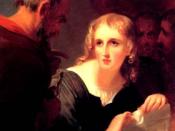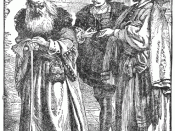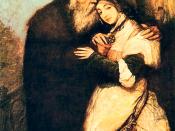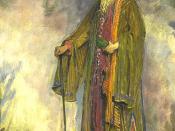In the play The Merchant of Venice Shakespeare portrays conflict between two noteworthy figures, Shylock and Antonio. Shylock is a Jewish moneylender who is viewed as an outcast due to his religion and job. Antonio, on the other hand, is a Venice merchant who enters a contract with Shylock in order to assist Bassanio's (his friend's) romance with Portia. Shakespeare allows his audience to choose whether Shylock is "a man more sinned against than sinning", "a man who sins more than sinned against", or "a man as much sinned against as sinning" based on their interpretation of his play.
In Act I, Scene III, we learn that Shylock is without doubt discriminated and often mistreated by the Christians because he is a Jew. When Antonio request to be lent three thousand ducats Shylock states, "You call me misbeliever, cutthroatdog, and spet upon my Jewish gabardine" (Shakespeare 18). Shylock recalls the times he has been berated by Christians specifically Antonio.
In reply, Antonio states that he does not regret his hatred toward Shylock and is likely to sin against him in the future. "I am as like to call thee so again, to spet on thee again, to spurn thee too" (Shakespeare 19). Furthermore, Antonio has caused Shylock suffering in the past when he has lent money out to people without due reason, which lowered the rate of interest and hindered Shylocks business.
Despite Antonio's hatred, Shylock attempts to establish a sense of friendship with him and be seen as an equal in the future. "I would be friends with you, and have your love, forget the shame that you have stained me with" (Shakespeare 19). Shylock and Antonio enter into a contract for three thousand ducats that must be paid back within 3 months. If Antonio fails to repay within the agreed upon time, Shylock is entitled to cut off one pound of his flesh. This bond questions the friendship Shylock wants to establish with Antonio. Antonio notes Shylocks kindness and agrees to the bond with confidence he will be able to repay the loan. It seems that Shylock's goal in offering friendship was to deceive (encourage) Antonio into entering the contract without hesitation.
In Act II, Jessica expresses that she is ashamed of her father, Shylock. "Alack, what heinous sin is it in me to be ashamed to be my father's child" (Shakespeare 31). Jessica questions her shame and deems it as a sin. Although she feels guilty, Jessica wants to escape her father's house and enter into a relationship with Bassanio's friend, Lorenzo. "O Lorenzo, if thou keep promise, I shall end this strife, become a Christian and thy loving wife" (Shakespeare 31). Jessica and Lorenzo create a plan in which they will elope and become married. It is evident that she has no regret leaving without discussing her plans with her father before she leaves.
Jessica and Lorenzo successfully elope one evening when Shylock has been summoned to dinner by Bassanio and Antonio. "Here, catch this casket; it is worth the pains, I am glad 'tis night, you do not look on me, for I am much ashamed of my exchange [clothes]" (Shakespeare 36-37). When Jessica leaves she takes with her a large amount of money and jewelry that belonged to her father. Later in the play, we learn that Shylock is outraged by Jessica's elopement and theft of his money and jewelry. "My Daughter! O my ducats! O my daughter! Fled with a Christian! O my Christian ducatsâ¦stol'n from me by my daughter" (Shakespeare 41). Jessica has sinned against her father by eloping with Lorenzo, converting to Christianity, and stealing from him.
In the opening scene of Act III, we learn that Antonio's ships have possibly been lost at sea. At this time this is merely a rumor stated by Solanio, but reaffirmed by Shylock when asked of Antonio's repayment of the three thousand ducats. "He hath disgraced me, and hind'red me half a million, laughed at my losses, mocked at my gains, scorned my nation, thwarted my bargainsâ¦and what's his reason? I am a Jew" (Shakespeare 49). Shylock is now out to seek revenge as a culmination of hatred and wrongdoings done to him. "If we are like you in the rest, we will resemble you in that. If a Jew wrong a Christian, what is his humility? Revenge! If a Christian wrong a Jew, what could his sufferance be by Christian example? Why? Revenge!" (Shakespeare 49). Shylock's refuses to pity Antonio and takes him to court.
In the court scene, we see Portia (disguised as a male lawyer) conclude that Shylock must show mercy to Antonio. "Then must the Jew be merciful" (Shakespeare 77). Shylock questions why he must be merciful and later brushes off the response he receives demanding his bond. Portia then asks if Antonio is able to pay the money, and Bassanio offers Shylock two times the amount and his own life in an effort to spare his friend. Shylock refuses and Portia request to look at the bond. After reviewing the document Portia concluded that Shylock is entitled to collect one pound of Antonio's flesh. When the time comes for Shylock to take Antonio's flesh, Portia reminds him that if shed any blood he will be guilty of taking the life of a citizen and lose possession of everything he has. "The words expressly are 'a pound of flesh.' Take then thy bond, take thou thy pound of flesh; but in cutting it, if thou dost shed one drop of Christian blood, thy lands and goods are by the laws of Venice confiscate unto the state of Venice" (Shakespeare 82). Portia seems to be misleading when she tells Shylock he is entitled to collect the bond and later saying by doing so he will be accused of murder.
After learning that he would be accused of murder (a sin), Shylock decides to accept the ducats offered to him. Portia refuses stating, "He shall have nothing buy the penalty" (Shakespeare 82). Shylock chooses to drop the case altogether, but when he does Portia tells him he has threatened the life of a Venetian. "The law hath yet another hold on you. "He [who] seek the life of any citizen, shall seize one half his goods to the party against which he contrive; the other half to the privy coffer of the state" (Shakespeare 83). Instead of taking half of Shylock's estate, the Duke orders him to pay only a fine. Similarly, Antonio offers to return his portion of the estate on the condition that Shylock convert to Christianity and will all of his wealth to Jessica and Lorenzo upon his death. Shylock agrees and departs losing all he has, including his religion.
In conclusion, Shylock has been sinned against and a sinner himself. He is sinned against by Christians, specifically Antonio, when they demean his religion. He is sinned against by Jessica when she expresses her shame, elopes and steals a portion of her father's wealth. Shylock is also sinned, in part, by Portia when she misleads him into be accused of seeking the life of a Venetian and when he is forced to become Christian when they will always see him as a Jew anyway. Shylock sins when he continually demands Antonio's pound of flesh and misrepresent the friendship he seemed to want. Based on this interpretation, I disagree with the view that Shylock is "as much sinned against as sinning", rather, I feel Shylock is "a man more sinned against than sinning."Works CitedShakespeare, William. The Merchant of Venice. New York: Penguin Putnam, Inc., 1998.
Works ConsultedUnknown. "Merchant of Venice Plot Review." Merchant of Venice Summary Guide. 2000-2005. Absolute Shakespeare. 20 May 2005






